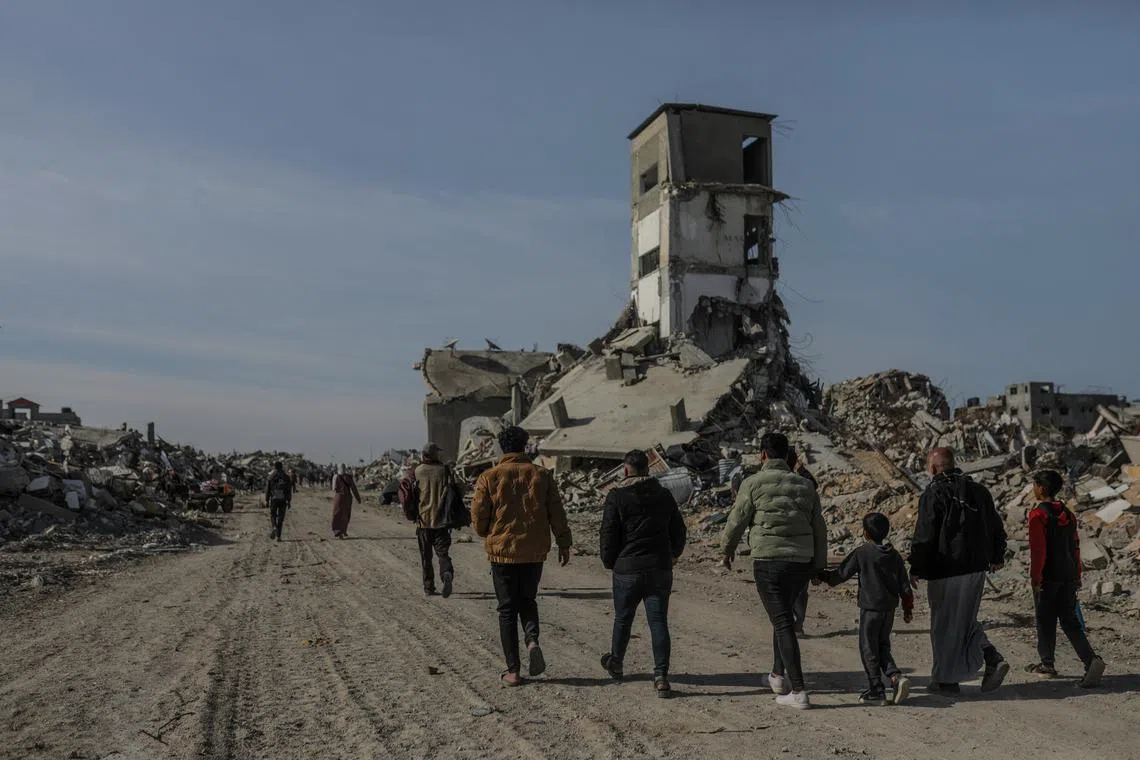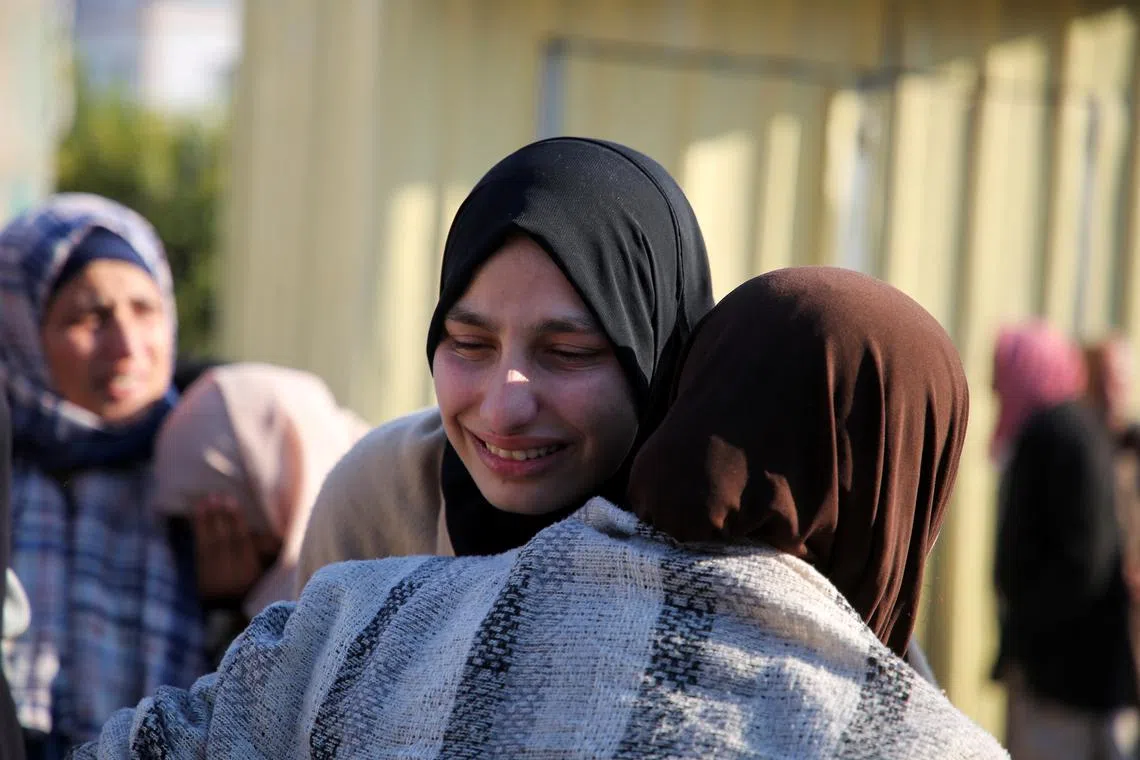Displaced Gazans head home, first hostages are freed as Israel-Hamas truce begins
Sign up now: Get ST's newsletters delivered to your inbox

Internally displaced Palestinians in Rafah town, in the southern Gaza Strip, on Jan 19.
PHOTO: EPA-EFE
DEIR EL-BALAH, Palestinian Territories – Thousands of displaced, war-weary Gazans set off across the devastated Palestinian territory to return to their homes on Jan 19, after a long-awaited truce between Israel and Hamas went into effect following an initial delay
The truce had been scheduled to begin at 8.30am local time but a last-minute dispute over the list of hostages to be freed on the first day led to the hold-up. Qatar, a mediator of the truce, later confirmed it had gone into effect.
The Israeli military said on Jan 20 that three released hostages – earlier in the day identified as Ms Emily Damari, Ms Romi Gonen and Ms Doron Steinbrecher – had crossed into Israeli territory accompanied by its troops.
“A short while ago, accompanied by IDF (military) and ISA (security agency) forces, the released hostages crossed the border into Israeli territory. The released hostages are currently on their way to an initial reception point in southern Israel, where they will undergo an initial medical assessment,” the military said in a statement.
Minutes after the truce began, the United Nations said the first trucks carrying humanitarian aid entered Gaza, where many residents are returning to nothing.
The ceasefire began nearly three hours later than scheduled, during which time Israel’s military said it was continuing to operate in Gaza, with the territory’s civil defence agency reporting 19 people killed and 25 hurt in bombardments.
Thousands of Gazans carrying tents, clothes and their personal belongings were seen heading back to their homes, after more than 15 months of war that displaced the vast majority of the territory’s population, in many cases more than once.
In the northern area of Jabalia, hundreds of Gazans streamed down a sandy path, returning to an apocalyptic landscape dotted with piles of rubble and destroyed buildings.
“We came here at six in the morning to find massive, unprecedented destruction,” said Mr Walid Abu Jiab, who returned to Jabalia. “There is nothing left in the north worth living for.”
Aid workers say northern Gaza is particularly hard-hit, lacking all essentials, including food, shelter and water.
In the main southern city of Khan Younis, people celebrated their pending homecoming.
“I’m very, very happy,” said Mr Wafa al-Habeel. “I want to go back and kiss the ground and the soil of Gaza (City). I am longing for Gaza and longing for our loved ones.”
Dr Jonathan Whittall, interim chief of the UN’s Ocha humanitarian agency for the Palestinian territories, said on X that the first trucks started entering Gaza following the truce, after “a massive effort” to prepare for a surge of aid across the territory.
Hundreds of trucks had been waiting at the Gaza border, some loaded with prefabricated houses. Egyptian Foreign Minister Badr Abdelatty said 600 trucks a day would enter Gaza after the ceasefire took effect, including 50 carrying fuel.
A total of 33 hostages taken by militants during Hamas’ Oct 7, 2023, attack on Israel
The truce is intended to pave the way for a permanent end to the war, but a second phase has yet to be finalised. It follows a deal struck by mediators Qatar, the US and Egypt after months of negotiations.
In a televised address on Jan 18, Israeli Prime Minister Benjamin Netanyahu called the 42-day first phase a “temporary ceasefire” and said Israel had US support to return to the war if necessary.
‘Full of hope’
In Gaza City, well before the ceasefire went into effect, people were already celebrating, waving Palestinian flags in the street. But when it became clear the truce had been delayed, the joy gave way to desperation for some.
“Enough playing with our emotions – we’re exhausted,” said Mr Maha Abed, a 27-year-old displaced from Rafah.
The Israeli army warned Gaza residents early on Jan 19 not to approach its forces or claimed Israeli territory.
“We urge you not to head towards the buffer zone or IDF (Israel Defence Forces)... for your safety,” military spokesman Avichay Adraee said on Telegram, adding that “moving from south to north via Gaza Valley puts you at risk”.
In Israel, the ceasefire was met with guarded optimism.
“I don’t trust our side or their side,” said taxi driver David Gutterman. “Always at the last moment, something, a problem, can pop up, but all in all, I’m really happy.”
Mr Shai Zaik, an employee at Tel Aviv’s art museum, said he had “mixed feelings” but was “full of hope” that the hostages would return after so many disappointments in the last year.
Israel has prepared reception centres to provide medical treatment and counselling to the freed hostages before they return to their families after their long ordeal.
The war’s only previous truce, for one week in November 2023, also saw the release of hostages held by militants in exchange for Palestinian prisoners.
Hamas’ Oct 7 attack, the deadliest in Israel’s history, resulted in the deaths of 1,210 people, mostly civilians, according to Israeli official figures.
Of the 251 people taken hostage, 94 are still in Gaza, including 34 who the Israeli military says are dead.

If war resumes, dozens of hostages could be left behind in Gaza.
PHOTO: REUTERS
Israel’s retaliatory campaign has destroyed much of Gaza, killing at least 46,899 people, most of them civilians, according to figures from the territory’s Health Ministry.
The truce took effect on the eve of Donald Trump’s inauguration for a second term as president of the US. Trump, who claimed credit for the ceasefire deal after months of effort by the outgoing administration of President Joe Biden, told US network NBC on Jan 18 that he had told Mr Netanyahu the war “has to end”.
“We want it to end, but to keep doing what has to be done,” he said.
Mr Brett McGurk, the point man for outgoing President Biden, was joined in the region by Trump envoy Steve Witkoff in an unusual pairing to finalise the agreement, US officials said.
Under the deal, Israeli forces will withdraw from densely populated areas of Gaza and allow displaced Palestinians to return “to their residences”, Qatari Prime Minister Mohammed bin Abdulrahman Al Thani said in announcing the deal. AFP


